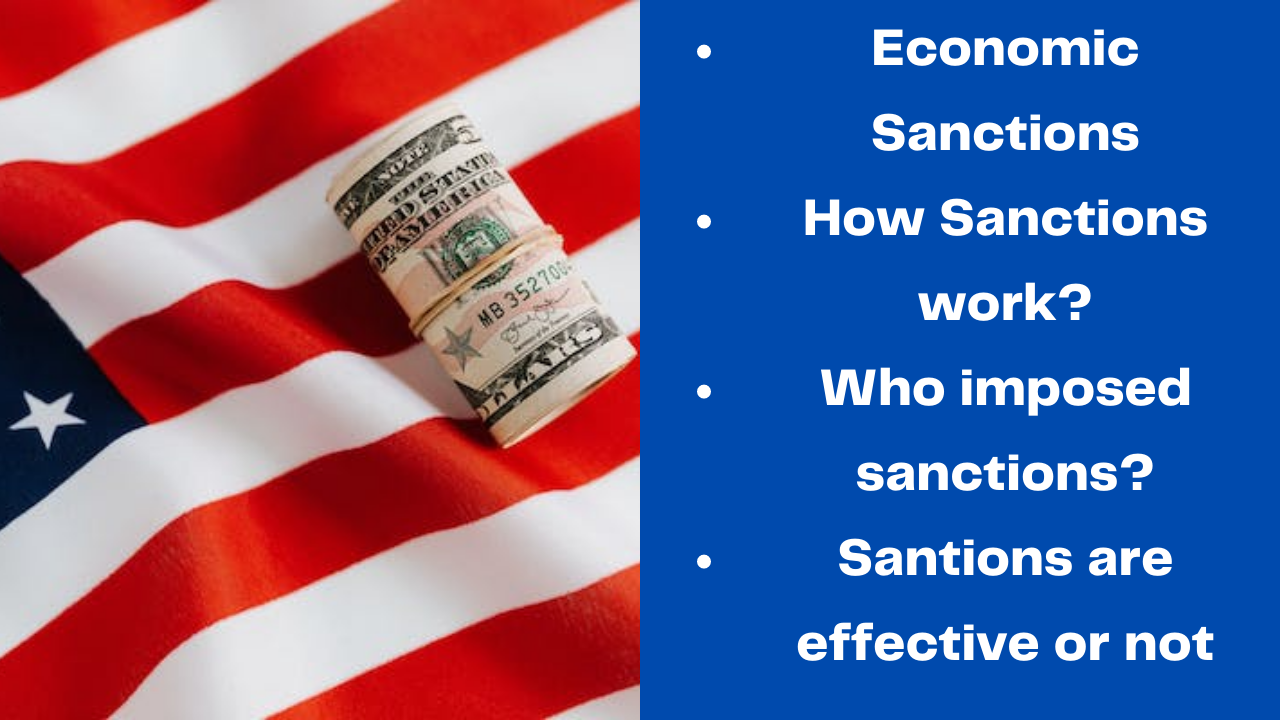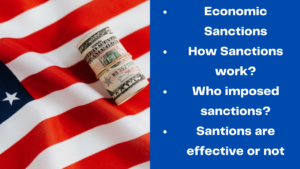
How Economic Sanctions Work – Do Economic Sanctions Have Good Results

Economic Sanctions
Economic sanctions refer to a range of measures taken by one country or group of countries against another country, with the aim of influencing the target country’s behavior by restricting or cutting off trade, investment, financial transactions, or other economic activities.
Sanctions can take various forms, including trade embargoes, asset freezes, travel bans, and restrictions on financial transactions, among others. They are typically imposed as a response to a perceived violation of international law, human rights abuses, or other issues of concern to the international community.
The effectiveness of economic sanctions is a subject of debate among scholars and policymakers. While some argue that they can be an effective tool for achieving foreign policy goals, others suggest that they can harm innocent civilians and have limited impact on the targeted regime. The success of sanctions largely depends on factors such as the strength of the target country’s economy, the nature of its government, and the level of support it enjoys from its allies.
How Economic Sanctions Work
Economic sanctions are a tool used by countries or international organizations to put pressure on a target country or entity to change their behavior. They can take many forms, including trade restrictions, financial penalties, and diplomatic isolation. Here’s how economic sanctions work:
Identification of a Target: Sanctions are typically imposed on countries that engage in behavior deemed unacceptable by the international community, such as supporting terrorism, violating human rights, or developing nuclear weapons.
Selection of Sanctions: Once a target is identified, the countries or organizations imposing the sanctions must decide which types of sanctions to use. These could include restrictions on trade, such as banning exports or imports, freezing assets or financial transactions, and limiting travel or diplomatic relations.
Implementation: The countries or organizations imposing the sanctions must then implement them, often through legislation or executive orders. Sanctions can be targeted at specific individuals or entities, or they can be more broadly applied to an entire country or sector of the economy.
Impact: Sanctions can have a significant impact on the target country or entity’s economy, potentially causing a decline in trade, investment, and financial flows. This can lead to higher inflation, unemployment, and other economic problems.
Compliance and Change: The ultimate goal of economic sanctions is to change the behavior of the target country or entity. This can be achieved by making it more difficult for them to conduct business as usual, which could compel them to change their policies or negotiate a settlement. In some cases, sanctions have been successful in achieving their intended objectives, while in others, they have had little effect.
Effects on Third Parties: Sanctions can also have a significant impact on third-party countries and entities that have economic ties with the target. These countries may suffer economic losses as a result of the sanctions, which can lead to political tensions and other problems.
Overall, economic sanctions can be a powerful tool for countries and international organizations to use to pressure targets to change their behavior. However, they can also have unintended consequences, and their effectiveness depends on a range of factors, including the severity of the sanctions, the nature of the target’s economy, and the level of international support for the sanctions.
Do Economic Sanctions have Good Results or Not
The effectiveness of economic sanctions in achieving their intended objectives is a highly debated topic, and there is no clear consensus on whether they are ultimately good or bad.
Some argue that economic sanctions can be a powerful tool for addressing human rights violations, promoting democracy, and preventing the proliferation of weapons of mass destruction. They point to cases where sanctions have successfully compelled countries to change their behavior, such as the lifting of sanctions on South Africa in the 1990s, which helped end apartheid.
Others argue that economic sanctions can be counterproductive, leading to unintended consequences and harming innocent civilians. They point to cases where sanctions have failed to achieve their intended objectives, such as the decades-long US embargo on Cuba, which has not led to a change in the country’s government or policies.
It is also worth noting that the impact of economic sanctions can vary depending on a range of factors, including the severity of the sanctions, the nature of the target’s economy, and the level of international support for the sanctions.
In conclusion, the effectiveness of economic sanctions is a complex issue, and the answer to whether they have good results or not depends on the specific case and the intended objectives. It is important to carefully consider the potential consequences of imposing sanctions and to weigh them against the potential benefits.
Top Countries under Economic Sanctions
As of my knowledge cutoff date of September 2021, the following are some of the top countries that were under economic sanctions:
Iran: Iran has been under various economic sanctions for decades, largely due to its nuclear program, support for terrorism, and human rights abuses.
North Korea: North Korea has been under international economic sanctions for its nuclear program and human rights violations.
Russia: Following its annexation of Crimea in 2014, Russia has been under economic sanctions imposed by the United States and the European Union.
Venezuela: Venezuela has been under economic sanctions from the United States and other countries due to its political crisis, human rights abuses, and corruption.
Syria: Syria has been under various economic sanctions since the start of its civil war in 2011, including sanctions from the United States, the European Union, and other countries.
It’s worth noting that the status of economic sanctions can change over time, and there may be other countries that are currently under economic sanctions or have been in the past.
Who imposed Economic Sanctions
Economic sanctions can be imposed by a variety of actors, including individual countries, groups of countries, or international organizations. Here are some examples of actors that can impose economic sanctions:
Individual countries: Governments can impose economic sanctions on other countries or entities to express disapproval of their behavior or to achieve specific policy goals. For example, the United States has imposed economic sanctions on Cuba, Iran, and Venezuela, among others.
Groups of countries: Countries can also work together to impose economic sanctions on other countries or entities. For example, the European Union has imposed economic sanctions on Russia in response to its annexation of Crimea.
International organizations: International organizations, such as the United Nations, can also impose economic sanctions. The United Nations has imposed economic sanctions on North Korea for its nuclear program, and on Iran for its nuclear program and human rights violations.
It’s worth noting that economic sanctions can have a range of effects, and their effectiveness in achieving their intended objectives is often debated. Some argue that economic sanctions can be a powerful tool for promoting human rights and preventing conflict, while others argue that they can harm innocent civilians and be ineffective in achieving their goals.
Admin at The Pakistan Gazette

